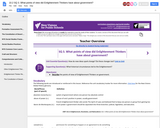
New Visions: Intro to Enlightenment
- Subject:
- History
- World History
- Material Type:
- Primary Source
- Provider:
- New Visions for Public Schools
- Date Added:
- 08/29/2018

New Visions: Intro to Enlightenment

This course asks students to consider the ways in which social theorists, institutional reformers, and political revolutionaries in the 17th through 19th centuries seized upon insights developed in the natural sciences and mathematics to change themselves and the society in which they lived. Students study trials, art, literature and music to understand developments in Europe and its colonies in these two centuries. Covers works by Newton, Locke, Voltaire, Rousseau, Marx, and Darwin.
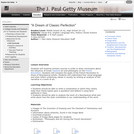
Students will examine primary sources in order to draw conclusions about the influence of Greek art and philosophy on the French Revolution. Students will compare the goals of the French Revolution to those of Neoclassical artists. Students will understand how visual language and style reflects underlying values in society by writing an analysis of the narrative in a work of art.
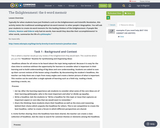
Typically for when students have just finished a unit on the Enlightenment and Scientific Revolution, this activity twists the traditional autobiographical six-word memoir to other people's biographies. You will ask your students to create six-word memoirs for the leading thinkers of the Enlightenment. If people like Voltaire, Newton and Diderot only had six words, how would they describe their accomplishments? In other words, summarize the life of a philosophe.”for more info:http://www.edutopia.org/blog/clarity-brevity-6-word-memoirs-jonathan-olsen
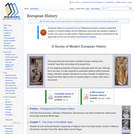
This project discovers the history of Modern Europe, starting at the Hundred Years War and ending at the present time.
A chronological perspective of history is attempted within this text. Although this is the case, it is also important to understand patterns within European History, therefore chapters will attempt to cover a breadth of material even though their titles might be that of a specific pattern in history rather than a time period.
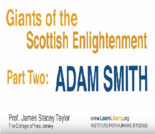
Professor James Stacey Taylor of the College of New Jersey discusses the contributions of philosopher and economist Adam Smith to the Scottish Enlightenment. Smith is best remembered as the father of modern economics, but he also made important contributions to philosophy in his book "The Theory of Moral Sentiments".
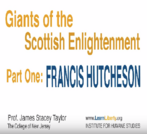
Professor James Stacey Taylor of the College of New Jersey discusses the contributions of philosopher Francis Hutcheson to the Scottish Enlightenment, especially his contributions to the sentimentalist approach to morality.
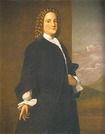
By the end of this section, you will be able to:Explain the significance of the Great AwakeningDescribe the genesis, central ideas, and effects of the Enlightenment in British North America
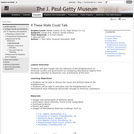
Students will gain insight into the influence of the Enlightenment on American society and government by comparing Neoclassical objects from the Getty collection to American civic architecture of the time.

This course examines the modern definition of freedom, and the obligations that people accept in honoring it. It investigates how these obligations are captured in the principles of our political associations. This course also studies how the centrality of freedom plays out in the political thought of such authors as Hobbes, Locke, Rousseau, Burke and Montesquieu, as well as debating which notions of freedom inspire and sustain the American experiment by careful reading of the documents and arguments of the founding of the United States.
This course is part of the Concourse program at MIT.
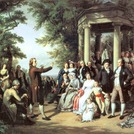
Textbook for Modern World Literature covering the Enlightenment period including works of selected authors.
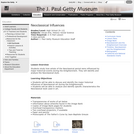
Students study how artists of the Neoclassical period were influenced by major historical events during the Enlightenment. They will identify and analyze the Neoclassical style.

How do counter narratives in our communities demonstrate that the historic ideals of liberty and equality born in the Enlightenment have become increasingly accessible to more communities today through the efforts of individuals or organizations?
This unit will examine the traditional themes of the European Enlightenment such as liberty and justice. Students will then explore how the same thinkers who left a legacy of proposed freedoms also created systemic discrimination for many communities. After engaging with primary sources and examining the history of imperialism, students will review news stories funded by the Pulitzer Center that connect this legacy to current global events. Ultimately students will create their own projects highlighting a narrative in their own community that counters traditional Enlightenment legacies. The idea is to identify and report on the disruptors to the past stereotypes.

This kit covers a historical overview of American representations of natural resources from ancient Indian basketry to contemporary web sites. It compares conflicting media constructions about the Exxon Valdez oil spill, the damning of rivers, and Chukchi sea oil drilling. By showing the slow realization that natural resources are finite, students will learn valuable lessons in earth, natural and environmental sciences.
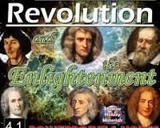
This is an activity for students to learn more about persons that were involved in the Scientific Revolution and the Enlightenment period. This activity will give students a chance to learn more about the people of this period and the paticular thoughts they came up with.
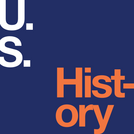
U.S. History is designed to meet the scope and sequence requirements of most introductory courses. The text provides a balanced approach to U.S. history, considering the people, events, and ideas that have shaped the United States from both the top down (politics, economics, diplomacy) and bottom up (eyewitness accounts, lived experience). U.S. History covers key forces that form the American experience, with particular attention to issues of race, class, and gender.Senior Contributing AuthorsP. Scott Corbett, Ventura CollegeVolker Janssen, California State University, FullertonJohn M. Lund, Keene State CollegeTodd Pfannestiel, Clarion UniversityPaul Vickery, Oral Roberts UniversitySylvie Waskiewicz


By the end of this section, you will be able to:Explain the significance of the Great AwakeningDescribe the genesis, central ideas, and effects of the Enlightenment in British North America
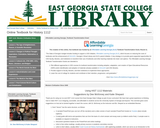
Lesson 1: The Age of Enlightenment, Reason & Scientific Revolution
Lesson 2: Changes in Political Thought: Imperialism, Colonialism, Nationalism, & Revolution
Lesson 3: Cultural Life, 1700-1900 - Arts, Music, Literature, & Religion
Lesson 4: The World Outside the West
Lesson 5: Industrialization & Lived Experiences
Lesson 6:The World in Two Wars
Lesson 7: Post-Colonial World Culture & Globalization
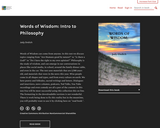
Words of Wisdom can come from anyone. In this text we discuss topics ranging from "Are Humans good by nature?" to "Is there a God?" to "Do I have the right to my own opinion?" Philosophy is the study of wisdom, and can emerge in our conversations in places like social media, in school, around the family dinner table, and even in the car. The text uses materials that are 2,500 years old, and materials that were in the news this year. Wise people come in all shapes and types, and from every culture on earth. We have poetry and folktales, sacred writings and letters. Dialogues and interviews, news columns, podcasts, Ted Talks, You Tube recordings and even comedy are all a part of the content in this text.You will be most successful using this collection this on line.